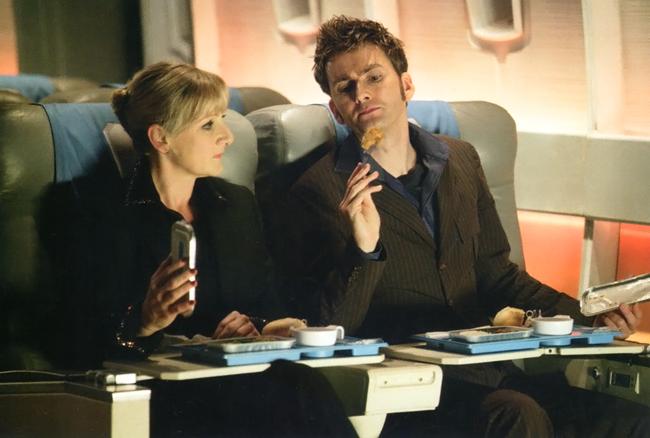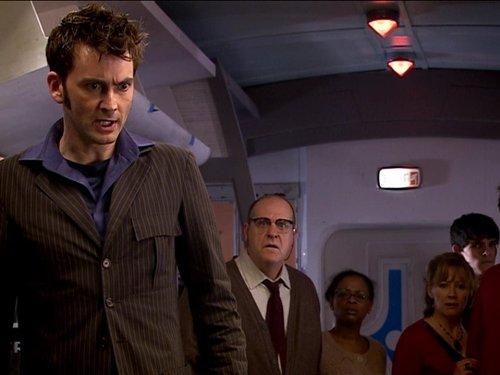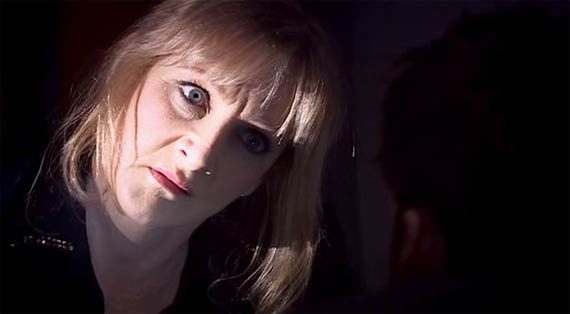This companion lite episode centres around the Doctor being trapped with a group of people during a tour of an inhospitable planet. The episode is a marked departure from Doctor Who featuring no proper companion or even monster, so what makes it so great?
‘Midnight’ is a masterfully written episode that explores the natural paranoia and mistrust present in every person. It is an examination of self preservation and human survival instinct. At the start of the episode we meet the characters, from the professor to the family everyone seems to be completely normal, but they all show their true natures when the situation spirals out of control. They all quickly turn on the smartest person in the room.
The Doctor.
The Doctor is naturally a leading figure of authority, even though some incarnations are more distant and reserved it is a part of the character to take charge and assume leadership in most situations, therefore it isn’t surprising that the Doctor appoints himself as the leader in ‘Midnight’ especially because he has extensive experience in these situations.
Therefore when things start to get worse and worse everyone immediately turns on the Doctor because he is in a position of power, they fear him because he knows more than them. The Doctor’s friendly yet commanding personality works against him because the other characters become convinced that he is involved with the ‘Midnight’ entity, and that killing him would save them.
This is a prime example of how desperation to survive can produce deadly paranoia that is almost more dangerous than the actual threat itself. The threat in ‘Midnight’ is highly unconventional, unlike almost every other Doctor Who episode you don’t actually see the monster in ‘Midnight’. This adds a lot to the episode because it furthers the paranoia and psychological horror of the story. The lack of a visual threat plays on humanity’s natural fear of the unknown. The inability to identify the ‘Midnight’ entity’s identity increases its terrifying nature because there’s no way to fight it. You don’t know what your up against. On top of this, what little we do know about the creature is chilling.
 A focal point of the episode is the possession of Skye Silvestry. When the ‘Midnight’ entity attacks the shuttle Skye is convinced that it is after her, and after everything has happened the monster has somehow taken control of her using her as a vessel.
A focal point of the episode is the possession of Skye Silvestry. When the ‘Midnight’ entity attacks the shuttle Skye is convinced that it is after her, and after everything has happened the monster has somehow taken control of her using her as a vessel.
Possessions have been a staple of horror stories for ages, playing on the instinctive fear of not being in control of your own body. By possessing Skye and stealing her voice, the creature strips her very identity hollowing her out. The ‘Midnight’ entity uses her to rapidly learn human speech and language. This gives weight to “Skye” being able to convince the group to kill the Doctor.
This creates the terrifying possibility of the ‘Midnight’ entity using Skye or any other person to integrate itself into the human race and do god knows what because it can jump host.
The entity seems to capitalise on emotions to gain access to people. First it possessed Skye who is recovering from a relationship breakup making her emotionally vulnerable than the other passengers, then it gains some kind of control over the Doctor.
This incarnation is one of the most human incarnations and as a result he is more emotional, this makes it easier for the creature to gain access to him. Additionally it exploits the groups increased paranoia and mistrust of the Doctor to divert their attention, knowing that they’ll kill him thereby highlighting it’s only obstacle and allowing it to escape to the human race while the only person who knows the truth is cast out.
The setting for this episode is one of it’s strongest elements. The planet Midnight is an amazing Sci-Fi concept, with the planet being made entirely of diamond but it’s deadly due to its intense radiation. Much like the first Doctor story ‘The Edge of Destruction’, limiting a story to one set because of budget cuts forces the writer to be more creative in their use of the setting. The emphasis character interactions and create a tense atmosphere. It really challenges a writer to think about how they can use such a restrictive setting effectively.
‘Midnight’ is one of Russell T Davies’ greatest scripts. He uses the cramped shuttle setting to create a claustrophobic, tense story that takes an in-depth look at basic human instinct and at the Doctor’s humanity as I mentioned before.
 I love that we don’t know what the entity is, how it operates, what it’s goal is, whether this is a survival mechanism or a start to a bigger plan. We literally know nothing. And we shouldn’t.
I love that we don’t know what the entity is, how it operates, what it’s goal is, whether this is a survival mechanism or a start to a bigger plan. We literally know nothing. And we shouldn’t.
I also love that it turns the Doctor’s greatest weapon, especially this incarnation, against him. His voice. The Doctor is always good at talking themselves out of situations or buying time but Tennant’s tenth Doctor did this a lot, I think more than any other incarnation before him. Here everytime he speaks it gives the creature more power & his attempts to calm the situation with his words backfires when his frustration builds and he shouts at them ‘Because I’m clever!’. It just took that one moment of anger.
It’s a perfectly designed villain, not just for the Doctor, but this specific incarnation of the Doctor. This might be the best enemy that the 10th Doctor faced.
He was powerless against this thing.
Something else I love is how unsettling the repeating thing is, its so simple. It’s so basic and childish but turned into something terrifying and then it shifts when it catches up and it talks at the same time, and then when Skye gets ahead of the Doctor… That is honestly a heart stopping moment. Even when you’re watching it on a repeat viewing, it’s so good!
Don’t get me wrong, I love Tennant as the Doctor but I really loved how the Doctor’s arrogance and his high opinion of himself comes back to bite him in the backside and puts him through the wringer in ‘Midnight’. This is possibly Tennant’s best episode.
 It’s through this entity that we get to know the characters. The Doctor’s arrogance backfires, the married couple are horrible people. The father of this three person family, the instant him feels like his masculinity or his bravery is being calling into question he starts to bluster. It brings out the worst as he tries to prove that he’s a take charge guy. His wife almost manipulates him when she’s operated by panic, I’m not saying she’s like that all the time but she really pushed him to do things. She doesn’t want to get her hands dirty. And then there’s their son Jeffro whose more laid back and not paying attention but by the end is just overwhelmed. Dee Dee is the brainy student and professor Hobbs – played by David Troughton, son of the second Doctor Patrick Troughton – just condescends Dee Dee because of his insecurities when his student threatens to know more than him about what’s going on. We also have driver Joe and the Mechanic Claude who are nice but they get killed early on. Same goes for the hostess who gets killed later on in the episode, she’s the real hero of this story.
It’s through this entity that we get to know the characters. The Doctor’s arrogance backfires, the married couple are horrible people. The father of this three person family, the instant him feels like his masculinity or his bravery is being calling into question he starts to bluster. It brings out the worst as he tries to prove that he’s a take charge guy. His wife almost manipulates him when she’s operated by panic, I’m not saying she’s like that all the time but she really pushed him to do things. She doesn’t want to get her hands dirty. And then there’s their son Jeffro whose more laid back and not paying attention but by the end is just overwhelmed. Dee Dee is the brainy student and professor Hobbs – played by David Troughton, son of the second Doctor Patrick Troughton – just condescends Dee Dee because of his insecurities when his student threatens to know more than him about what’s going on. We also have driver Joe and the Mechanic Claude who are nice but they get killed early on. Same goes for the hostess who gets killed later on in the episode, she’s the real hero of this story.
These are all brilliant fully developed characters, and the actors give us brilliant performances. The characters actually feel like people. This episode is just something else.
The most interesting character is Skye. The intensity in her eyes and her line delivery is honestly one of the creepiest things you’ll see in a Doctor Who episode. The icing on the cake is seeing the same thing shown through David Tennant with his fantastic performance, one minute he’s his usual self and the next he isn’t. If it wasn’t for the hostess he would’ve been killed.
Speaking of the hostess, who we never learn the name of, she was interesting because out of all the passengers, starting from the beginning she is in an unenviable position because she has to reassure everyone with a script that the company has but she abandons the script and realises the drivers are dead and the rules are literally out the window she probably has the strongest sense of character.
She is the first person to suggest that they throw Skye out of the bus, when the Doctor calls everyone’s bluff and says ‘Would you throw me out as well’ she’s the first person to say ‘If we have to’. She has a lot of strength of character once she realises that she can’t just fall back on the rules and figure things out herself.
Its this same strength that makes her the only one that acts when the Doctor is going to get thrown out, even though there are one conflicted and two other people that believe that the Doctor shouldn’t be thrown out but she’s the only one that acts.
I genuinely think this is one of those episodes that is important to the show. Not because of any plot device, but because it was an episode that hit every viewer in the heart. The end symbolises that the greatest hero’s are the one’s no body knows about, like the Doctor, even though everyone knows who he is we don’t know his real name.
 It also shows a part of human nature that we don’t like acknowledging: The mob mentality and the need for a scapegoat. The Doctor has a reputation for defending the human race and commending humanity as being a complex and wonderful species. This is a time when he genuinely dislikes them because they acted in a way that is the opposite of what he praises them for. It really gets me with the look of disappointment at the humans on the Doctor’s face when Val says ‘I said it was her’. It was really powerful.
It also shows a part of human nature that we don’t like acknowledging: The mob mentality and the need for a scapegoat. The Doctor has a reputation for defending the human race and commending humanity as being a complex and wonderful species. This is a time when he genuinely dislikes them because they acted in a way that is the opposite of what he praises them for. It really gets me with the look of disappointment at the humans on the Doctor’s face when Val says ‘I said it was her’. It was really powerful.
The stellar writing of the episode is really brought to life by the brilliant directing of Alice Troughton, the directing does a great job in bringing out the claustrophobic paranoia, all the performances in the episode are fantastic, especially David Tennant and Leslie Sharp, the latter having to learn the entire script in order to repeat every word along with having to match Tennant’s lines as he spoke them. Much like the writing, the limited setting really challenges the entire cast and crew to step out of their comfort zone and try to exploit the setting, using it to it’s best potential.
‘Midnight’ is truly an experimental masterpiece. The writing, directing, acting and score all form a short psychological horror film that can be watched and enjoyed by everyone. It’s gripping on multiple viewings and it still shines 16 years later. The episode is a terrifying examination of humanity’s selfish survival instinct and how it can corrupt anyone. The possibility of the Doctor getting thrown out of the shuttle is such a tense and heart racing scene and Davies finishes up the episode with one more jab at humanity. Before finishing with another exploration of the Doctor’s emotional vulnerability.

